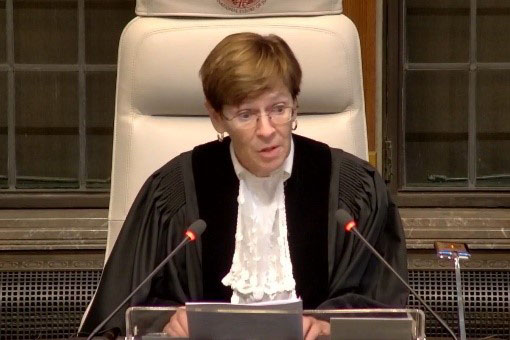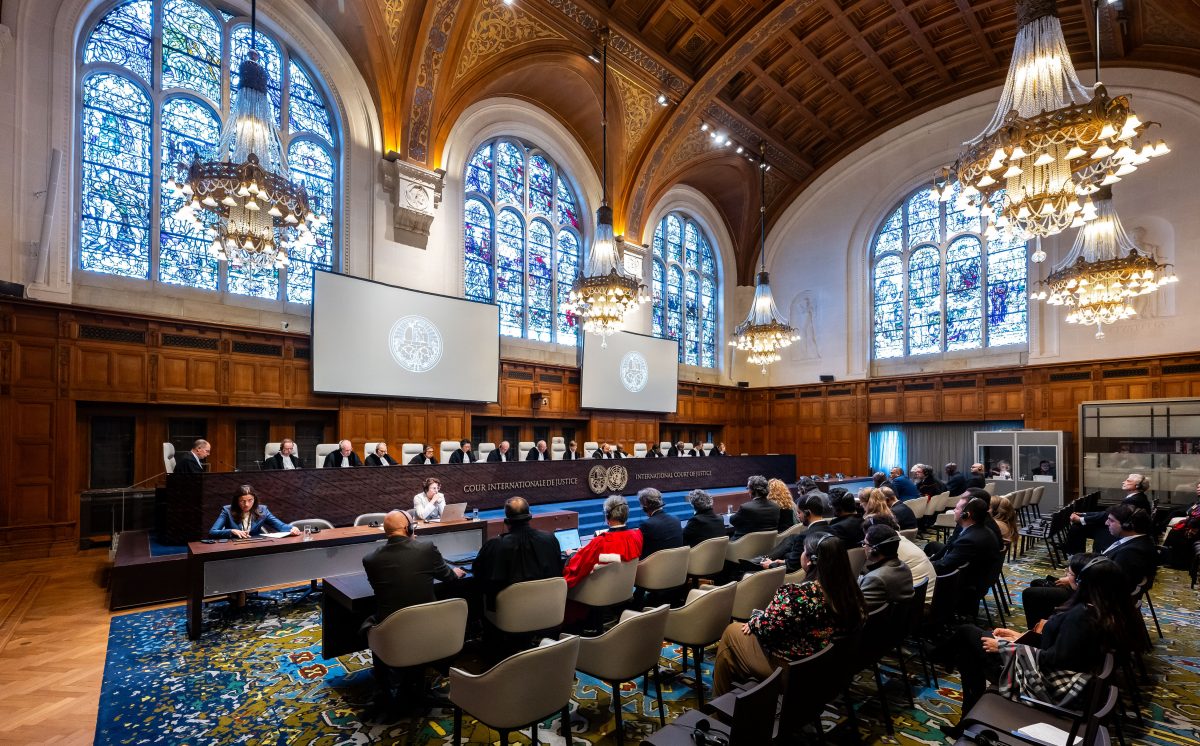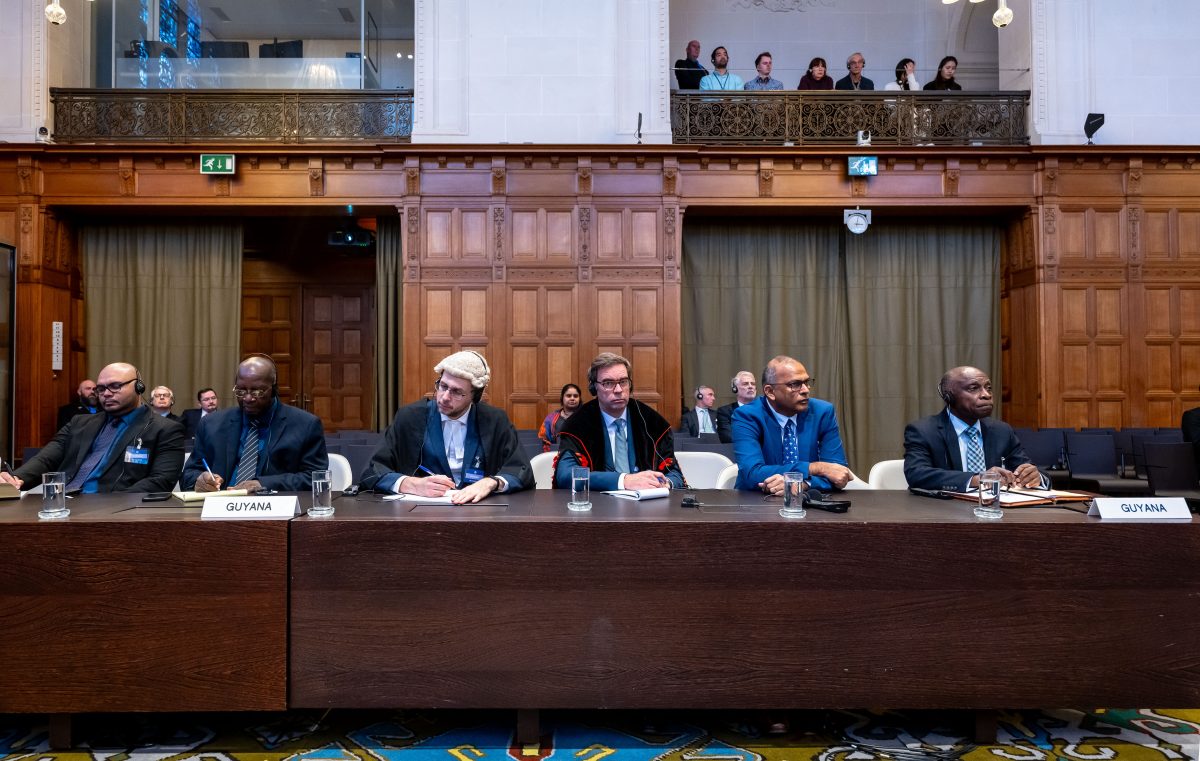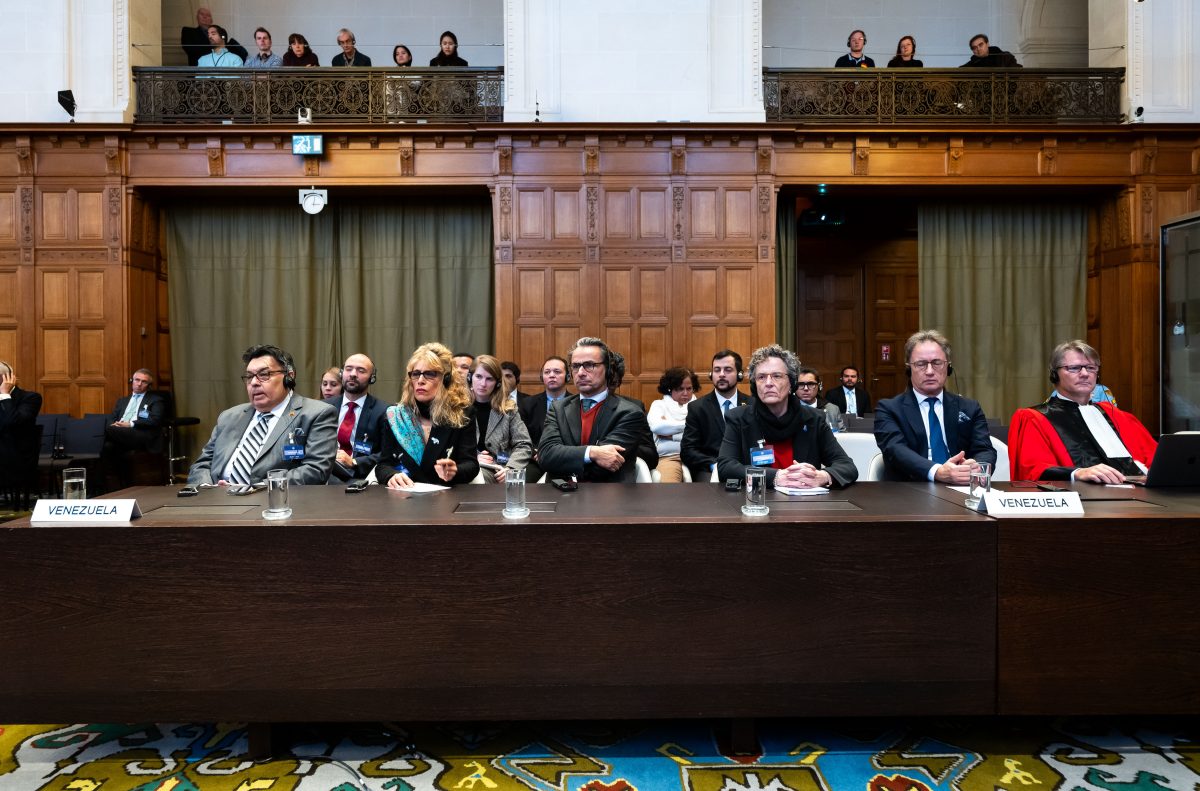Recognizing the referendum which Venezuela had planned for tomorrow as a seriously “urgent,” “real” and “imminent” threat to the rights which Guyana currently has to the Essequibo, the International Court of Justice (ICJ) has issued a warning of refrain to Venezuela.
“Pending a final decision in the case, the Bolivarian Republic of Venezuela shall refrain from taking any action which would modify the situation that currently prevails in the territory in dispute, whereby the Co-operative Republic of Guyana administers and exercises control over that area,” the Netherlands-based World Court which sits at the Peace Palace in the Hague has ordered.
The Court said it observes that the situation which currently prevails in the territory, is that Guyana administers and exercises control over that area; and so, pending its final decision, Venezuela must refrain from taking any action which would modify that situation.
The 14-Judge panel yesterday morning delivered a unanimous ruling in favour of Guyana which had requested provisional measures following Venezuela’s announcement of the referendum which is seen as an act of aggression intended to lay the path for annexation.
The court also said unanimously that neither Venezuela nor Guyana should take any measure to aggravate conditions related to the 1899 arbitral award case currently before the court.
The judge pointed out the binding nature of the order:
“The Court recalls that its orders indicating provisional measures under Article 41 of the Statute have binding effect and thus create international legal obligations for any party to whom the
provisional measures are addressed”.
The substantive challenge over the area, regarding the merits of the controversy in the 1899 Arbitral Award of Essequibo to Guyana is currently pending before the court for determination.
Reading the judgment yesterday on Guyana’s request for provisional measures, President of the court, Justice Joan E. Donoghue said that Guyana’s right currently to sovereignty over the territory in question, “is plausible.”
This was the assertion made by the Court after its examination of whether Guyana had satisfied the requirements to have applied to it for provisional measures in the first place.
Caracas’ contention which was outrightly rejected by the Court, was that the rights asserted by Guyana were not plausible.
Justice Donoghue noted in the ruling that the power of the Court to indicate provisional measures under Article 41 of its Statute, has as its object the preservation of the respective rights claimed by the parties in a case which is pending before it for ruling on the merits.
In deference to legal precedent, she said it follows therefore, that the Court must be concerned to preserve by such measures the rights which may subsequently be adjudged by it to belong to either party.
Against this background she noted that the Court may therefore exercise that power only if it is satisfied that the rights asserted by the party requesting provisional measures are at least plausible.
She was keen to caution that at this stage of the proceedings, the Court is not called upon to determine definitively whether the rights which Guyana wishes to see protected exist; but rather need only to decide whether the rights claimed by Guyana on the merits, and for which it is seeking protection, are plausible.
Moreover, she noted that a link must exist between the rights whose protection is sought and the provisional measures being requested.
Validity
Guyana had sought the preservation and protection of its right to the territory awarded to it by the 1899 Award, pending the Court’s determination of the validity of that Award, and to the integrity of its territory, or, alternatively, its right to the settlement by the Court of the land boundary between it and Venezuela.
It had submitted that its rights are directly threatened by Venezuela’s planned referendum and anticipated incorporation of Essequibo into Venezuela in accordance with what the Spanish-speaking nation had said was its people’s “inevitable” response to the question regarding the creation of the Guayana “Esequiba State.”
Guyana had further submitted that its rights were plausible at this current stage of the proceedings and that any other conclusion would prejudge the outcome of the case on its merits.
To Guyana’s request for provisional measures, Venezuela had contended that the rights asserted by Guyana were not plausible.
To this point which the Court rejected, the President, Justice Donoghue referenced its previous finding that a land boundary dispute exists between the parties.
She said that the court further observes that the territory which forms the object of that dispute was awarded to then-British Guiana (now Guyana) in the 1899 Award. “For these reasons, the Court considers that Guyana’s right to sovereignty over the territory in question is plausible,” she said.
The other requirement for the grant of provisional measures which Guyana needed to satisfy—and did—was to establish a link between the rights it was seeking, and the measures requested.
In examining this requirement, Justice Donoghue said the Court observed that one of the provisional measures requested by Guyana, sought to ensure that Venezuela does not take any actions intended to prepare or allow for the exercise of sovereignty or de facto control over any territory that was awarded to it in the 1899 Award.”
The President said the Court considers that this measure is aimed at protecting Guyana’s plausible right; and against this background concluded that a link exists between the right claimed by Guyana and the provisional measures requested.
Another prerequisite condition which needed to be present for the grant of provisional measures, was that the provisions relied on by the applicant needed to appear, at least prima facie, to afford a basis on which the court’s jurisdiction could be founded.
For this, the Court made reference to its ruling handed down back in December 2020, finding that it did have jurisdiction to adjudicate the substantive challenge brought by Guyana; in so far as it concerns the validity of the 1899 Award and the related question of the definitive settlement of the land boundary dispute between the two countries.
The World Court next turned its attention to the “risk of irreparable prejudice and urgency,” which it said under Article 41 of its Statute empowers it to indicate provisional measures when such prejudice could be caused to rights which are the subject of judicial proceedings, or when the alleged disregard of such rights may entail irreparable consequences.
In delivering the judgment, Justice Donoghue cautioned, however, that the power of the Court to indicate provisional measures will be exercised only if there is urgency, in the sense that there is a real and imminent risk that irreparable prejudice will be caused to the rights claimed before the Court gives its final decision.
She underscored that the condition of urgency is met when the acts susceptible of causing irreparable prejudice can “occur at any moment” before the Court makes a final decision on the case.
Against this background, she said that the Court must therefore consider whether such a risk exists at this stage of the proceedings; while cautioning that that enquiry is not to be confused for a decision on either party’s position on the merits of the substantive challenge.
The Court was careful to point out that the determination at this stage was whether the circumstances require the indication of provisional measures for the protection of the right found to be plausible.
“It cannot at this stage make definitive findings of fact, and the right of each party to submit arguments in respect of the merits remains unaffected by the Court’s decision on the request for the indication of provisional measures” Justice Donoghue said.
Guyana submitted that, if Venezuela proceeds with its scheduled referendum, the “inevitable” affirmative response would lead Venezuela to annex the Essequibo region and to grant Venezuelan citizenship to its inhabitants, causing irreparable harm to Guyana’s rights.
In Guyana’s view, even a judgment of the Court on the merits upholding the validity of the 1899 Award or settling the boundary dispute in a manner that leaves all or part of the Essequibo region under Guyana’s sovereignty might not be sufficient to protect Guyana’s rights if Venezuela has already annexed that territory.
Guyana’s contention has been that this is a “particularly exemplary” situation in which the rights of the party requesting provisional measures are “irremediably threatened” and must be preserved pursuant to Article 41, of the court’s Statute.
Guyana argued that the need for provisional measures could not be more urgent since Venezuela’s referendum had been scheduled to take place tomorrow; while asserting that urgency was further demonstrated by the public statements of Venezuela’s highest civilian and military leaders indicating that Venezuela’s armed forces are ready and determined to “recover our Guayana Esequiba.”
Caracas sought to assert that holding a consultative referendum is an exercise of sovereignty and that “[n]one of the outcomes of the referendum will have any adverse impact on Guyana’s alleged title over the disputed territory and even less create a risk of irreparable harm to Guyana.”
It went on to contend that its decision to call a consultative referendum was made known to Guyana over two years ago.
On the questions of whether irreparable prejudice could be caused to the plausible right currently held by Guyana to the disputed territory and whether there is urgency, in the sense that there is a real and imminent risk that irreparable prejudice will be caused to that right before the Court gives its final decision, the International Court underscored Venezuela’s Supreme Tribunal of Justice confirming the constitutionality of the questions to be posed in the referendum.
Justice Donoghue said the Court recalls that the fifth question of the referendum refers explicitly to the “creation of the Guayana Esequiba State,” as well as “an accelerated and comprehensive plan [to] be developed” for the “granting of Venezuelan citizenship and identity cards” to the population of that territory, consequently incorporating the “[Guayana Esequiba] State into the map of Venezuelan territory.”
She said the Court also noted Venezuela’s statements during the proceedings that it “will not turn its back on what the people decide in the referendum”.
The Court recalled that on October 24th, 2023, Venezuela’s President, Nicolás Maduro, publicly stated that the referendum “is the first time that all arguments—political, diplomatic, legal, historic, territorial—are given to our people so that we take a collective decision as a country.”
Other official statements Justice Donoghue noted suggest that “Venezuela is taking steps with a view towards acquiring control over and administering the territory in dispute.”
She said that for instance, on November 6th, 2023, Venezuela’s Minister of Defence, General Vladimir Padrino López, made an appeal to “go to combat” with reference to the territory in question.
Furthermore, she said that Venezuelan military officials announced that Venezuela is taking concrete measures to build an airstrip to serve as a “logistical support point for the integral development of the Essequibo.”
Justice Donoghue said the Court considers that, in light of the strong tension that currently characterizes the relations between the parties, the circumstances present a serious risk of Venezuela acquiring and exercising control and administration of the disputed territory.
It was against this background the Court concluded that “there is a risk of irreparable prejudice” to the right claimed by Guyana; while adding that it further considers that “Venezuela’s expressed readiness to take action with regard to the territory in dispute…at any moment following the referendum,” “demonstrates that there is urgency, in the sense that there is a real and imminent risk of irreparable prejudice to Guyana’s plausible right before the Court gives its final decision.”
With Guyana having met all the conditions for the indication of provisional measures in full, Justice Donoghue said that it became necessary, pending the court’s final decision on the merits of the substantive challenge, to indicate certain measures which would protect the plausible right claimed by Guyana.
Exercising its power under Statute, the Court ruled that given the situation that currently prevails in the disputed territory that Guyana administers and exercises control over that area, then pending the final decision in the case, “Venezuela must refrain from taking any action which would modify that situation.”
The Court was again keen to caution and reemphasise that the question of the validity of the 1899 Award and the related question of the definitive settlement of the land boundary dispute between the parties are matters still to be decide at the merits stage.
President Justice Donoghue said the Court recalls that Guyana has requested it to indicate measures aimed at ensuring the non-aggravation of the dispute with Venezuela.
On this point she said that when indicating provisional measures for the purpose of preserving specific rights, the Court may also indicate provisional measures with a view to preventing the aggravation or extension of a dispute whenever it considers that the circumstances so require.
relying on legal precedent, she said that in the current case, having considered all the circumstances, in addition to the specific measure it has decided to take, the Court deems it necessary to indicate an additional measure “directed to both parties and aimed at ensuring the non-aggravation of the dispute between them.”
She asserted that the orders indicating provisional measures under Article 41 have binding effect and sternly warned that they thus create international legal obligations for any party to whom the provisional measures are addressed.
For these reasons, the Court unanimously indicated the provisional measure that pending its final decision, Venezuela shall refrain from taking any action which would modify the situation that currently prevails in the disputed territory which Guyana administers and exercises control.
Further, it ordered both parties to “refrain from any action which might aggravate or extend the dispute before the Court or make it more difficult to resolve.”
Venezuela’s submissions
During the single round of arguments held on the measures sought by Guyana, Venezuela had declared that absolutely nothing—not even the Court—could prevent its referendum, restating its position that the Essequibo belongs to it, and that it is prepared to fully defend its sovereignty.
In fact, Venezuela sought to reiterate its previously stated position that the International Court of Justice has no jurisdiction to even adjudicate the border controversy between it and Guyana over Essequibo.
Venezuela’s Vice President and Agent for her country to the Court, Delcy Rodriguez, had told the Court that Venezuela’s participation in the hearing by way of submissions, ought not to be interpreted as recognition of the jurisdiction of the Court to hear the controversy.
Her contention to the Court was that her country has a right to hold its referendum.
Guyana has described the planned referendum an “existential threat” to its sovereignty and territorial integrity, and had submitted to the Court that Caracas was seeking to evade the jurisdiction of the Court and its acts of aggression are intended to lay the path for annexation.
On October 31st, Guyana applied to the World Court for urgent provisional measures in the wake of the referendum announced by Venezuela, which Guyana described as a “sham.”
In its response to Guyana’s application, Venezuela had contended that the interim measures requested by Georgetown, were “in flagrant violation of the Charter of the United Nations and the Statute of this Court.”
Rodriguez in her address to the Court had said that Guyana’s attempt to revoke the Venezuelan constitutional order by preventing the consultative referendum is unacceptable. “Venezuela will not accept it” she declared.
She described the 1899 arbitral award by which Essequibo was declared Guyana’s, as dispossessing Venezuela of its territory by fraud.
The Venezuelan Vice President said that Venezuela’s historical position is expressly contained in the 1966 Geneva Agreement, “which does not recognise the judicial route as the amicable means of reaching a practical solution satisfactory to the parties.”
Venezuela accuses Guyana of not only abandoning and transgressing the Geneva Agreement, but said “it now intends to flout the international order and promote a change in the Venezuelan political system through interventionist and reckless action that seeks to instrumentalize the Court against Venezuela.”
“This is a clear line of action of judicial colonialism,” Rodrigues told the panel of international judges.
Describing Guyana’s call for the cancellation of the planned referendum in its present form as “reckless” and interfering in the internal affairs of Venezuela, Rodriguez strongly affirmed, “nothing will prevent the referendum scheduled for 3 December from taking place.”
The organisation of a consultative referendum is an exercise of sovereignty and self-determination of the people. There is no authority for Guyana to restrict the right of the Venezuelan people to freely establish their political status or to intervene in their internal affairs, she went on to add.
In his presentation on behalf of Venezuela; Professor Makane MoïseMbengue declared, “Nothing in international law allows Guyana to dictate to Venezuela, through the Court, how its constitutional bodies should perform their functions,” he asserted; emphasising to the Court that it is common practice in constitutional law to hold referendums, especially when the boundaries or extent of the national territory are at stake.
Guyana’s submissions
With the controversy over the 1899 arbitral award still pending before the Court for final settlement, Guyana denounced the aggressive new measures taken by Venezuela in furtherance of its claim to Essequibo.
The purported referendum is being seen as a move to ratify the Venezuelan government’s apparent decision to withdraw from the present judicial proceedings before the World Court, and proceed unilaterally to incorporate the Essequibo Region into its own national territory as an integral part of Venezuela.
Agent for Guyana to the Court, Carl Greenidge in his address wasted no time in telling the World Court that Caracas’ latest move constitutes an “existential threat” to Guyana and to more than two-thirds of its national territory.
Greenidge was keen in pointing out that what the referendum in essence seeks to do, is create a new Venezuelan State by annexing and incorporating into its own territory, Guyana’s entire Essequibo Region and to also grant Venezuelan citizenship to the population.
Emphasising that Guyana must therefore safeguard its rights to the county, Greenidge said that any “seizure” of Essequibo by Venezuela would be irreversible, if, in the Court’s judgment on the merits, it rules that the 1899 Award is valid and that Guyana is the lawful sovereign.
He said that not only would the harm to Guyana be irreparable, but that its loss would be permanent.
In his address to the Court, Counsel on behalf of Guyana, Paul Reichler emphasised that irreparable harm would beset Guyana, should Venezuela’s planned referendum be held.
He pointed to the clear demarcation on the map of the Essequibo belonging to Guyana, as had been fixed by the arbitrators; noting that it was the same boundary that had been demarcated by a joint commission and formally agreed to by Venezuela itself in 1905 and ratified by its national congress.
Reichler was particularly keen in pointing out that it is the very boundary that Venezuela has itself “consistently” recognised, as the international boundary with British Guiana without interruption and without formal protest until 1962.
On this point, counsel for Guyana referenced Venezuela’s clear message in its planned referendum, of seeking to carry out actions that it has already decided to take—which include—the definitive and final rejection of the 1899 Arbitral Award, the rejection of the Court’s jurisdiction in settling the controversy, the refusal of recognising the Court as the means of settlement, the annexation of Essequibo and the defence of the territory against Guyana’s assertion of its rights.
Reichler, an international law attorney surmised that the outcome intended by the Venezuelan government, could not be clearer as the collective decision being called for by its people involves nothing less than the annexation of the territory.
Background
Venezuela began issuing threats to Guyana in October, despite the case being before the court for final settlement.
Guyana sought the urgent protection of the Court, by filing with it a Request for Provisional Measures.
In that Request, Guyana sought from the Court an Order preventing Venezuela from taking any action to seize, acquire or encroach upon, or assert or exercise sovereignty over, the Essequibo Region or any other part of Guyana’s national territory, pending the Court’s final determination of the validity of the Arbitral Award that established the land boundary between our two States, and the final and binding nature of that boundary.
On October 30th, Guyana requested the Court to indicate the following provisional measures:
“1. Venezuela shall not proceed with the Consultative Referendum planned for 3 December 2023 in its present form;
2. In particular, Venezuela shall not include the First, Third or Fifth questions in the Consultative Referendum;
3. Nor shall Venezuela include within the ‘Consultative Referendum’ planned, or any other public referendum, any question encroaching upon the legal issues to be determined by the Court in its Judgment on the Merits, including (but not limited to):
a. the legal validity and binding effect of the 1899 Award;
b. sovereignty over the territory between the Essequibo River, and the boundary established by the 1899 Award and the 1905 Agreement; and
c. the purported creation of the State of ‘Guayana Esequiba’ and any associated measures, including the granting of Venezuelan citizenship and national identity cards.
The five questions being asked at the Venezuelan referendum are:
Do you agree to reject by all means in accordance with the law the line fraudulently imposed by the Paris Arbitration Award of 1899 that seeks to deprive us of our Guayana Esequiba?
Do you support the 1966 Geneva Agreement as the only valid legal instrument to reach a practical and satisfactory solution for Venezuela and Guyana regarding the controversy over the territory of Guayana Esequiba?
Do you agree with Venezuela’s historical position of not recognizing the jurisdiction of the International Court of Justice to resolve the territorial controversy over Guayana Esequiba?
Do you agree to oppose by all means in accordance with the law Guyana’s claim to unilaterally dispose of a sea pending delimitation illegally and in violation of international law?
Do you agree with the creation of the Guyana Esequiba state and the development of an accelerated plan for the comprehensive care of the current and future population of that territory that includes, among others, the granting of citizenship and Venezuelan identity card in accordance with the Geneva Agreement and international law, consequently incorporating said state on the map of Venezuelan territory?













